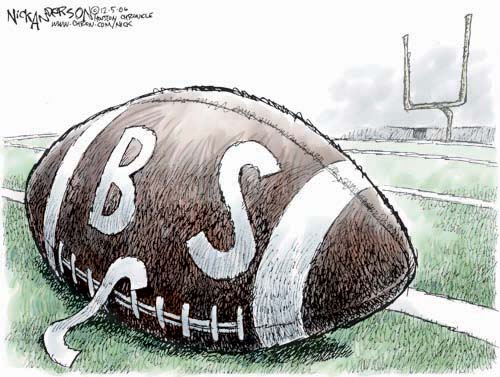As promised (or threatened. Whatever.), today we start the three part exploration of the “National Championship” process, including a look at the money trail on the current system, and a discussion about the relevancy for the whole thing. Much of this is from my work on an earlier site; I’ve updated it as best as possible because you deserve the best.
Because, it’s not enough to point fingers- I want us to really know the facts. First, we figure out how we get to where we are today.
Let’s start off by remembering that as the game was in its formative stages, it was more prestigious than “professional” football. There were major concerns that almost had the game banned, and it was only “Papa Bear” Halas’ ability to sign Illinois legend Red Grange to the Bears that gave the NFL any credibility. College football is big now, but it used to have no competition- no NFL, no NBA, no PBA.

And, college football existed before the NCAA (it was founded to address football’s issues)- which is may also be why the NCAA has never had a ‘champion’ for football. It’s also important to note that the NCAA basketball tournament has always existed (although, at one time it was less significant than the NIT, but that’s another post), so there’s always been sanctioned “championship”.
In this context, the first thing to realize is that (once upon a time) everyone was OK with the media or others deciding this and letting folks know.
You know an obnoxious Notre Dame fan who’s obsessed with all of their national championships? Or a Mich1gAAn fan with the same obsessions? Or even an Army fan who remembers when they were good (it’s true)? Back then, it was up to sports writers (like the Heisman, the MVP for the season) to make that determination.
But they weren’t the only ones- there were multiple “champions”, designated by differing groups. For instance, Ohio State has five “official” championships and seven other ones. So the idea of a “true” champion is mostly a modern one- our ancestors were either OK with the complexity, enjoyed the debate, or simply had better things to do. My vote is the latter- there just wasn’t 24 hour coverage online and on cable of sports (not that I’m complaining).

At one point, though, things got complex when the good folks in Pasadena decided to host a little game in 1902 in order to raise awareness for tourism and for their parade. That first game was Michigan and Stanford (I know, but it’s true), and saw Michigan win 49-0. But the Rose Bowl wasn’t always a Big T1e1n and Pac-10 event; one of the most famous moments in college football occurred in a game against Georgia Tech and Cal (I know, because my grandfather listened to it on the radio).
With the success of trips to California, other cities soon got into the act- Florida and Texas soon hosted bowl games of their own. To ensure a crowd, these games began to approach conferences in order to set up the best match ups and provide a vacation spot for fans from the east coast, the Midwest, and the plains states.
In all of this, though, the idea of “championship” never came into consideration. Even through the 80’s, there were split “championships“, as the Associated Press and Coaches Poll would select different teams. But any attempt to change the bowl alignments to facilitate a better process went out the window with the 1984 anti-trust decision that allowed for colleges (and conferences) to negotiate their own television deals (which is why Notre Dame has their own deal with NBC).
Because conferences were creating their own contracts, they were working to create the television rights for their bowl agreements. All the NCAA could do was “recognize” these bowl games (meaning “allow student athletes to play, and member institutions to participate”). “Recognizing” is not “sanctioning”.
This leads us to our next discussion regarding the financial realities of the current system, but let’s finish with a quick summary:
- NCAA never had a national champion for college football
- Bowls have never about championships or playoffs (only money; first from tourism, now from television)
- The NCAA is limited in their ability to change the bowl process and create a playoff now due to legal precedent
Next in our journey: Follow the money… The major barrier to making any changes. And why it’s not as lucrative for your alma mater as you might imagine.
Add The Sports Daily to your Google News Feed!
